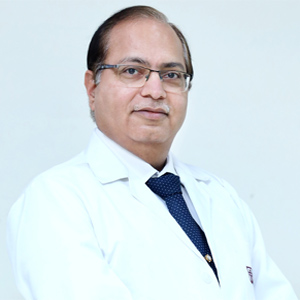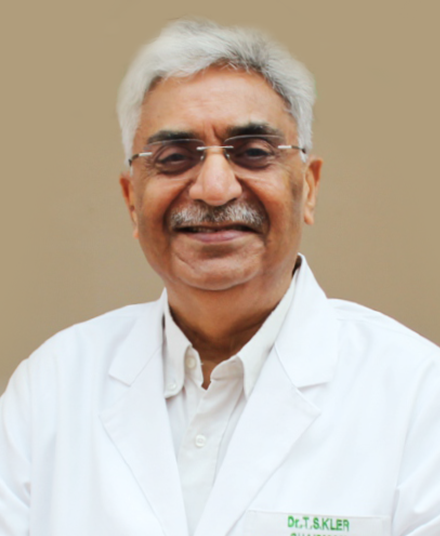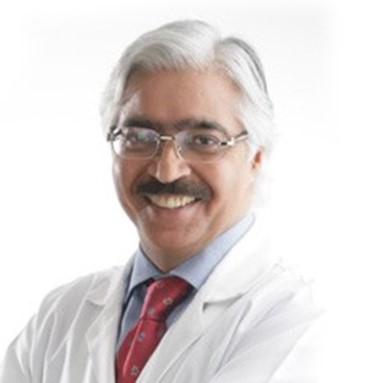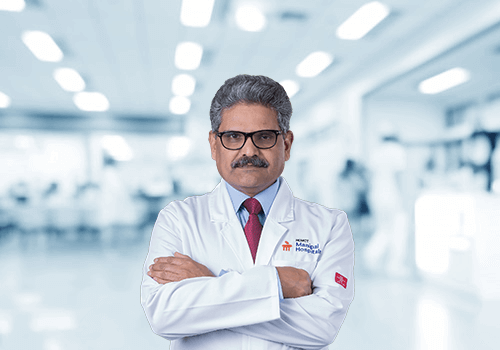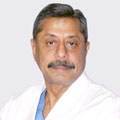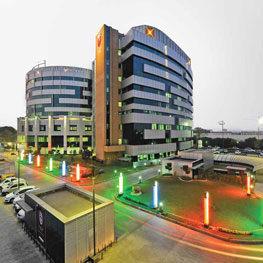About the Doctor
Dr. Ramji Mehrotra, one of the leading names in the field of Cardio Thoracic and Vascular Surgery (CTVS). He has vast experience of more than 26 years. He brings with him rich experience of Beating Heart Surgery, Total Arterial CABG and legacy of many successful procedures.
Specialization
- Total Arterial CABG
- Beating Heart CABG
- Complex Bypass including Endarterectomies
- Value Repairs & Replacement, Sutureless Valve
- Surgery for Aneurysm including Bentall Operations
- Congenital Heart Surgeries
- Minimal Access Cardiac Surgeries
- Surgery for Heart Failure (ECMO, LVAD, Heart Transplantation)
- Endovascular Procedures including TAVI / TAVR
Awards
- Performed first total arterial revascularization at Apollo Hospitals, New Delh
- Performed first total arterial revascularization using bilateral mammary arteries at Indraprastha Apollo Hospitals, New Delhi
- Established total arterial revascularization program using bilateral mammary arteries at Fortis Escorts Heart Institute, New Delhi
- Performed first minimal incision OPCAB total arterial revascularization at Indraprastha Apollo Hospitals, New Delhi
- Performed total arterial CABG on youngest patient in India aged 10 years
- Performed first successful arterial switch operation in Mumbai, India
- Started Paediatric Cardiac Surgery at Indraprastha Apollo Hospitals, New Delhi
- Setup Paediatric Cardiac Surgery facility at Asian Heart Institute, Mumbai
- Time of India “Legends of Cardiac Surgery” award
Frequently Asked Questions About Cardiology
What are the conditions a cardiologist can treat?
Heart disease is not a single condition, but a general term used for a variety of diseases and conditions that can affect the heart. At Fortis, the cardiologists specialize in treating a wide range of cardiac conditions, as mentioned below
- Adult congenital diseases
- Arrhythmia
- Congenital cardiac disease
- Angina
- Endocarditis
- Heart failure
- Heart valve disorders
- Heart attack
- Valvular disease
- Hypertension
Is a referral from a general physician necessary, to get a prescription from a cardiologist?
Usually, a general physician refers a patient to a heart specialist or cardiac surgeon. However, a person can directly ask for a cardiologist consultation too.
What are the risks of heart surgery?
All major surgeries including any heart surgery carries some risks. However, the result of these surgeries is usually excellent and hence the benefits outweigh the risks. Some associated risks of heart surgery are as mentioned:• Bleeding
- Bleeding
- Signs of inflammation such as swelling, pain, infection, fever.
- Complications related to anaesthesia like nausea, vomiting, headaches, etc.
- Irregular heartbeats/Arrhythmias
- Peripheral vascular disease
- Damage to internal tissues of heart, lungs, liver, and kidneys
- Stroke
- Death (This might occur in people who are critically ill before the surgery)
In general, the risk of complications increases if any heart surgery is performed in an emergency, ex. during a heart attack. The risk is also higher if the patient has some other underlying conditions or diseases, such as kidney disease, lung disease, diabetes or peripheral arterial disease. The cardiologists at Fortis will evaluate all the potential risks and help determine the best course of treatment for the patient.
Are smoking and heart disease-related?
About 30% of cardiac deaths in India are directly related to smoking. Smoking is a leading cause of atherosclerosis. Among other things, nicotine in smoke can lead to:
- Less oxygen supply to the heart
- Higher blood pressure and heart rate
- More blood clotting
- Damage to cells that line coronary arteries and other blood vessels.
What are the most common heart attack symptoms?
Symptoms of a heart attack include:
- Discomfort, pressure, heaviness, or pain in the chest, arms, or under the chest
- Feeling of discomfort that radiates to the back, neck, jaw, or arms
- A feeling of poor digestion or suffocation (may feel acidic)
- Sweating, nausea, vomiting or dizziness
- Extreme weakness, anxiety or shortness of breath
- Irregular heartbeat
During a heart attack, symptoms usually last 30 minutes or more and do not decrease with rest or taking medication. The first symptoms can appear as mild symptoms that cause considerable pain. Some people experience asymptomatic heart attacks called “silent” myocardial infarction (MI). It is more common in people with diabetes. If you feel you have a heart attack, do not wait immediately go to the hospital. Treating your heart attack right away is very important to reduce damage to your heart.
How
What are the different kinds of cardiology tests?
Cardiology is the study and treatment of the disorders that affect the heart and blood vessels. If you are experiencing heart disease or are at risk of it, then your cardiologist will prescribe some tests that will help them diagnose and treat your condition. Some of the common tests carried out are:
Electrocardiogram (ECG): This test will record the electrical activity of the heartbeat. This will help the doctor determine if the activity is normal, slow, fast or irregular. It also helps them understand if any part of your heart is under strain and is being overworked.
Ambulatory ECG: Records the heart’s rhythms while the person is engaged in a physical activity like running or walking on a treadmill. Small metal electrodes are stuck on the patient’s chest that help record the heart’s rhythm.
Stress test: This shows the heart’s activity when you’re exercising, and while you’re resting. This test will determine the limitations and performance levels of your heart.
Echocardiogram: Provides an ultrasound picture that displays the structure of the heart chamber and its surroundings. This is done to detect inflammation and infections in the heart valves.
